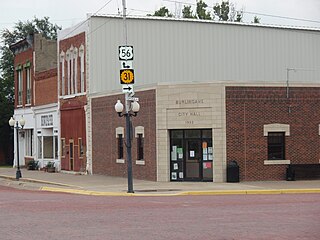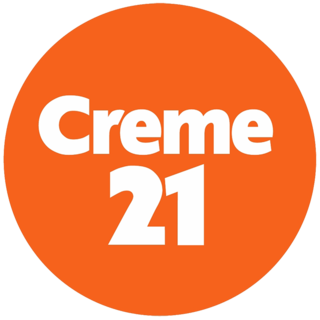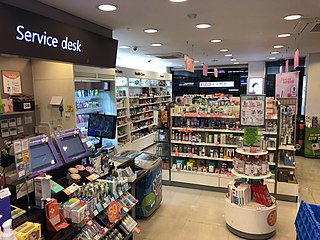Related Research Articles

Cosmetics are composed of mixtures of chemical compounds derived from either natural sources or synthetically created ones. Cosmetics have various purposes, including personal and skin care. They can also be used to conceal blemishes and enhance natural features. Makeup can also add colour to a person's face, enhance a person's features or change the appearance of the face entirely to resemble a different person, creature, or object.

Sephora is a French multinational retailer of personal care and beauty products, offering nearly 340 brands alongside its own private label, the Sephora Collection. Its product range includes cosmetics, skincare, fragrance, nail color, beauty tools, body products, and hair care items.

Shiseido Company, Limited is a Japanese multinational cosmetic company founded in Tokyo, Japan in 1872. Its product categories consist of: skin care, makeup, body care, hair care, and fragrances. The company is one of the oldest cosmetic companies in the world and celebrated its 150th anniversary in 2022. It is the largest cosmetic firm in Japan and the fifth largest cosmetic company in the world. In Japan, Shiseido is available at cosmetic counters at selected department stores and most pharmacies. The company owns numerous brands and subsidiaries worldwide, in addition to its founding label. The company is headquartered in Tokyo, and is traded on the Tokyo Stock Exchange, where it is a constituent of the Nikkei 225 and TOPIX Large70 indices.
Green Cross Health is a provider of primary health care services around New Zealand, including pharmacies and medical clinics. It is based in Ellerslie, Auckland.

Origins Natural Resources, Inc., trading as Origins, is an American cosmetics brand founded in 1990 by Leonard Lauder, son of Estée Lauder. It is one of the original brands of The Estée Lauder Companies.

The history of cosmetics spans at least 7,000 years and is present in almost every society on earth. Cosmetic body art is argued to have been the earliest form of a ritual in human culture. The evidence for this comes in the form of utilised red mineral pigments including crayons associated with the emergence of Homo sapiens in Africa. Cosmetics are mentioned in the Old Testament—2 Kings 9:30 where Jezebel painted her eyelids—approximately 840 BC—and the book of Esther describes various beauty treatments as well.

A food desert is an area that has limited access to food that is plentiful, affordable, or nutritious. In contrast, an area with greater access to supermarkets and vegetable shops with fresh foods may be called a food oasis. The designation considers the type and the quality of food available to the population, in addition to the accessibility of the food through the size and the proximity of the food stores.

Creme 21 is a German-origin skincare brand which was founded in 1967 by Henkel. It is now owned by an Indian conglomerate company, Emami, and is based in Bad Homburg vor der Höhe, Hesse, Germany.
Paula Beth Begoun, also known as "The Cosmetics Cop", is an American talk radio host, author, and businesswoman. She is the founder of Paula's Choice and Beginning Press Publishing.

e.l.f. Beauty, Inc. is an American cosmetics brand based in Oakland, California. It was founded by Joseph Shamah and Scott Vincent Borba in 2004. Items include bath and skin-care products, mineral-based makeup, professional tools, eyeliners, lipstick, glosses, blushes, bronzers, brushes, and mascara, among others.
No7 is a beauty brand of anti-ageing creams, skincare and cosmetic products developed by Boots in the United Kingdom. The brand No7 was launched by Boots in 1935 as a selection of eleven skincare products and was expanded in 1937 with some colour cosmetics. Since its introduction, the brand has undergone eight redesigns. In 2007, Boots expanded the range to incorporate body products, foundation, creams and men's skincare.

The cosmetic industry describes the industry that manufactures and distributes cosmetic products. These include colour cosmetics, like foundation and mascara, skincare such as moisturisers and cleansers, haircare such as shampoos, conditioners and hair colours, and toiletries such as bubble bath and soap. The manufacturing industry is dominated by a small number of multinational corporations that originated in the early 20th century, but the distribution and sale of cosmetics is spread among a wide range of different businesses. Cosmetics must be safe when customers use them in accordance with the label's instructions or in the conventional or expected manner. One measure a producer may take to guarantee the safety of a cosmetic product is product testing. FDA occasionally does testing as part of its research program or when looking into potential safety issues with a product. Both the cosmetics business and consumers can benefit from the FDA's resources on product testing.
Walgreens Boots Alliance, Inc. (WBA) is an American multinational holding company headquartered in Deerfield, Illinois, which owns the retail pharmacy chains Walgreens in the US and Boots in the UK, as well as several pharmaceutical manufacturing and distribution companies. The company was formed on December 31, 2014, after Walgreens bought the 55% stake in Alliance Boots that it did not already own. The total price of the acquisition was $4.9 billion in cash and 144.3 million common shares with fair value of $10.7 billion. Walgreens had previously purchased 45% of the company for $4.0 billion and 83.4 million common shares in August 2012 with an option to purchase the remaining shares within three years. Walgreens became a subsidiary of the newly created company after the transactions were completed. As of 2022, Walgreens Boots Alliance is ranked #18 on the Fortune 500 rankings of the largest United States corporations by total revenue.
FSN E-Commerce Ventures Ltd, d/b/a Nykaa, is an Indian retail company, headquartered in Mumbai. It sells beauty, wellness and fashion products through its website, mobile app and over 100 physical stores. In 2020, it became the first Indian unicorn startup headed by a woman.
Tarte Cosmetics is an American cosmetics company headquartered in New York City.

K-beauty is an umbrella term for skincare products that are derived from South Korea. The fad gained popularity worldwide, especially in East Asia, Southeast Asia, South Asia, and the Western world, and focuses on health, hydration, and an emphasis on brightening effects.

CJ Olive Young Corporation is a health and beauty product store based in South Korea. Olive Young opened its first store in Sinsa-dong, Gangnam in December 1999 under the management of CJ Systems and pioneered Korea's health and beauty market. Olive Young's main slogan is "All live young with Olive Young." which reflects the main philosophy 'Natural Healthy' of Olive Young. In 2021, Olive Young is solidifying its No.1 position in the Korean H&B market, which was hit directly by Covid-19.

Male cosmetics include all cosmetic products marketed towards men, such as makeup, skincare products, hair care products, body care products, sun care products, perfumes, and other decorative cosmetics.
Monat Global Corp., or simply Monat, is a privately-held American multi-level marketing company headquartered in Doral, Florida, which sells haircare, skincare, and wellness products. It is a subsidiary of the Alcora Corporation, a private-labeling company formed in 2001. Monat operates in the U.S., Canada, the U.K., Ireland, Poland, Spain, Australia, New Zealand, Lithuania, France, Mexico, and Colombia.
References
- ↑ Brînzac, Monica G; Kuhlmann, Ellen; Dussault, Gilles; Ungureanu, Marius I; Cherecheș, Răzvan M; Baba, Cătălin O (2023-07-08). "Defining medical deserts—an international consensus-building exercise". The European Journal of Public Health. 33 (5): 785–788. doi:10.1093/eurpub/ckad107. ISSN 1101-1262. PMID 37421651.
- ↑ "Food deserts: Definition, effects, and solutions". www.medicalnewstoday.com. 2020-06-22. Retrieved 19 October 2024.
- ↑ Chevillard, Guillaume; Lucas-Gabrielli, Véronique; Mousques, Julien; Dill, Ly Lan (2018). "Medical deserts in France: Current state of research and future trends". L’Espace géographique (in French). 47 (4): 362–380. ISSN 0046-2497.
- ↑ "There Is No Inclusivity in Beauty Without Accessibility". beautymatter.com. Retrieved 19 October 2024.
- ↑ "VC funding and the Black beauty industry". www.mckinsey.com. Retrieved 21 October 2024.
- ↑ Lobad, Noor (2022-06-23). "Addressing Racial Inequity in Beauty Is a $2.6B Opportunity, McKinsey Reports". WWD. Retrieved 21 October 2024.
- ↑ "Black representation in the beauty industry | McKinsey". www.mckinsey.com. Retrieved 21 October 2024.
- ↑ "Beauty E-Commerce Industry Trends and Examples in 2024 | Peel Insights". www.peelinsights.com.
- ↑ "Black representation in the beauty industry | McKinsey". www.mckinsey.com. Retrieved 23 October 2024.